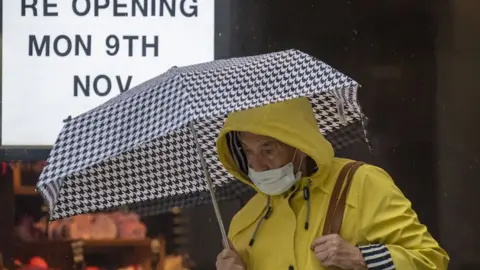Covid: No plans for October lockdown, says government
 Getty Images
Getty ImagesThe government has denied newspaper reports that it is planning an October lockdown in England.
The i newspaper said plans had been drawn up to extend the school half-term holiday, if the number of hospitalisations continue at the current level.
The i said a full lockdown was unlikely - but the government could introduce some rules as part of a "firebreak".
However the Department for Education said the report was "not true".
"It is not true that the government is planning a lockdown or firebreak around the October half term," it said in a tweet.
The prime minister's spokesman also denied the report. He said plans had been kept for a range of scenarios - "but these kind of measures would only be reintroduced as a last resort to prevent unsustainable pressure on our NHS".
"I think we've been clear throughout that we will take action, and indeed we have done when necessary to protect our NHS," he said.
But the spokesman pointed out that when rules were brought in the past, the UK did not yet have the protection from vaccines.
On Tuesday the UK recorded another 37,489 coronavirus cases, with 209 deaths within 28 days of a positive test.
Four in five people in the UK aged 16 and over are now fully vaccinated against Covid-19, the latest figures show. Health Secretary Sajid Javid said it was "a phenomenal achievement".

Will the NHS get overwhelmed?

If the NHS was at risk of collapse the return of restrictions is possible. Contingency plans are, of course, in place.
But the key question is - what is the likelihood of this? Very few of those scientists advising government think it's a likely scenario.
And - as one scientist put it to me - "if we were going to suggest anything it wouldn't be closing schools".
That's not to say there isn't real concern about winter.
Covid, plus the return of normal winter viruses made worse by lack of immunity from social distancing and lockdown last year, means the coming months are likely to be very difficult for the NHS.
Care could be rationed and performance deteriorate as happens quite often in winter.
But it is important to remember currently fewer than 7% of beds are occupied by Covid patients - and the numbers are not rising rapidly.

Earlier, the government's vaccines minister Nadhim Zahawi said he hoped booster jabs would avoid the need for any new lockdown rules.
"Look, vaccines have given us the ability to reduce infections, to save 100,000 lives," he told BBC Breakfast.
"I'm not going to be arrogant and say to you this is a done deal, it's all over, it's fine, this virus is no longer in pandemic stage.
"But I hope through the booster programme we can transition the virus from pandemic to endemic status and deal with it year in, year out... but not have to close down our economy or take the severe measures we had to sadly take in December of last year."
The first booster vaccines for the most vulnerable are expected this month.
The latest advice from the Joint Committee on Vaccination and Immunisation - which advises the government on vaccines - suggests more than 30 million people should receive a booster dose of Covid vaccine.
That number includes all over-50s and anyone over 16 who qualifies for a flu jab.
Separately to the booster jabs, about 400,000 to 500,000 people in the UK who are severely immuno-suppressed will also be eligible for a third dose of vaccine. This is different to a booster jab, and they may also get a booster at a later date.
Mr Zahawi also emphasised that the flu vaccine was important.
"I worry about flu," he said. "We've got a big flu programme that has begun and will continue throughout the winter months as well as, I hope, our Covid booster programme which will begin shortly this month."
The number of people in hospital with coronavirus has been slowly climbing in recent weeks - although it is still far below the peak in January this year.
So far, nearly 80% of adults in the UK are fully vaccinated, while almost 89% have had a first dose.


- THE GREATEST PHARAOH: Who was Ramesses The Great and why was he beloved?
- IS CHOCOLATE GOOD FOR YOU?: Why eating a small amount of dark chocolate can be healthy

